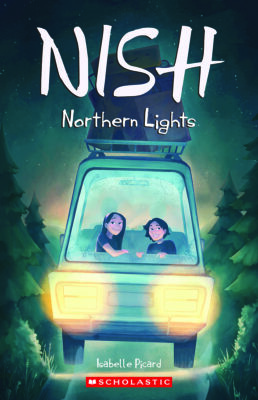Nish: Northern Lights is the second book in Isabelle Picard’s Nish series. The fourteen-year-old twin protagonists, Eloise and Leon, have moved from their home village of Matimekush to the Quebec City region. They leave their friends, are told they need to repeat Secondary II, and have to adjust to a very different life from the one they are used to. Along the way, Leon’s confidence in his hockey skills is tested by his experiences with a new team, Eloise is harassed by a mean-spirited classmate, and they both weather the effects of time and distance on their long-standing relationships at home. They also make new friends and learn things about themselves, their people, and their history that they might never have known if they had stayed in one place.

Nish: Northern Lights
Isabelle Picard
Translated by Kateri Aubin Dubois
Scholastic Canada
$14.99
paper
296pp
9781039704558
It is also a slow story. There is some repetition and circularity in the plot – Eloise’s boy problems, Leon’s hockey games – which means the pages do not always turn on their own. A larger problem is that there is little to distinguish Eloise’s and Leon’s voices from one another. I was sometimes halfway through a chapter before I met with a confusing detail that sent me back a few pages to verify who was narrating.
Although the novel is not hard to follow as a stand-alone story, this second volume in the series will be best enjoyed after reading the first. It was difficult to feel invested in some of the secondary characters, especially the friends back in Matimekush and the relatives who pop in and out, without the background experience provided by Nish: North and South. The first novel also offers some higher stakes (a missing community member, a sick parent); the conflicts in Northern Lights are less gripping on the whole.
A third installment, North Stars, is coming soon. (The “North” title motif makes sense, but I can’t be the only one who finds the almost-identical titles confusing.) Readers will likely look forward to learning more about some of the story arcs raised in the first two books (the troubled home lives of more than one friend, for example, are intriguing but so far underdeveloped). Northern Lights feels like an interlude, leaving readers wanting a little more tension and resolution than is provided.
All in all, Nish: Northern Lights is both a simple story about adolescence and a revealing look into the lives of Innu teenagers trying to grow up and understand a new world at the same time. The series brings an important voice into the world of middle-grade literature, and will no doubt appeal to readers looking for a tale of Indigenous teenage life that is both realistic and inviting.mRb






0 Comments